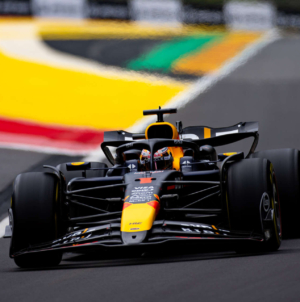-
Reds vs. Rays Highlights | MLB on FOX - 14 mins ago
-
F1 News: Red Bull Hit With Unexpected Fines at Belgian Grand Prix - 27 mins ago
-
Interview with Rheinmetall Hungary CEO, Paul Walf - 55 mins ago
-
Athletics vs. Angels Highlights | MLB on FOX - 57 mins ago
-
Harrison Butker’s Comments on Olympics Opening Ceremony Goes Viral - about 1 hour ago
-
Rockies vs. Giants Highlights | MLB on FOX - 2 hours ago
-
Archaeologists Find Ancient Egyptian Artworks Hidden Below Nile Waters - 2 hours ago
-
Cubs vs. Royals Highlights | MLB on FOX - 2 hours ago
-
Woman Explains Why She Decided To Have Rescue Dog Euthanized Over Behavior - 2 hours ago
-
On this day in history, July 27, 1940, Bugs Bunny debuts in animated film ‘A Wild Hare’ - 3 hours ago
Biden Escalates US Economic War With China
The Biden administration is set to significantly increase tariffs on Chinese electric vehicles, quadrupling them from 25 percent to 100 percent.
The move is the latest salvo in a trade war between the two superpowers that kicked off in 2918, during the Trump administration. Both countries are now in a race to dominate the electric vehicle market and are heavily investing in EV technology and infrastructure. This announcement followed a four-year review into the effectiveness of U.S. tariffs on China.
In a statement, U.S. Trade Representative Katherine Tai said the decision to increase tariffs was made “to encourage the elimination of the People’s Republic of China’s unfair technology transfer-related policies and practices that continue to burden U.S. commerce and harm American workers and businesses.”
Tai also proposed numerous other tariff increase targeting strategic sectors, including an increase to 50 percent for semiconductors and solar cells.
Newsweek has contacted Tai for further comment via email to the Office of the United States Trade Representative.
Brendan Smialowski/AFP via Getty Images
The move is part of a broader strategy to protect U.S. industries from competitive pressures, particularly from Chinese firms that have benefited from state subsidies, although the U.S. EV industry received improved subsidies as part of the 2022 Inflation Reduction Act.
A spokesperson for The White House told Newsweek: “This strong action is targeted to specific sectors. China should not view this as an escalation, but if they retaliate, we have the means and the will to defend our interests […] We have also been vocal that China’s non-market excess capacity is unfair. The President and Ambassador Tai will defend American workers and businesses and work to ensure our supply chains are resilient and secure.”
American auto industry groups have expressed concerns about the threat China’s EV competition poses to U.S. domestic production. An Alliance for American Manufacturing report described it an “existential threat” to the U.S. auto industry.
“Outside estimates suggest that China’s unfair practices have resulted in significantly lower costs driven by subsidies and market distortions. These tariffs will combat those practices and level the playing field for America’s automakers, which have been the bedrock of our manufacturing sector for decades,” a White House spokesperson told Newsweek.
In April, the U.S. Government warned that Chinese-made smart cars could “collect sensitive data about our citizens and our infrastructure and send this data back to the People’s Republic of China.”
Speaking at a press conference on Tuesday, Chinese Foreign Ministry spokesperson Wang Wenbin told reporters: “China has always opposed the unilateral imposition of tariffs in violation of [World Trade Organization] rules and will take all necessary measures to safeguard its legitimate rights and interests.”
Newsweek has contacted the Chinese Foreign Ministry for additional comment.
Uncommon Knowledge
Newsweek is committed to challenging conventional wisdom and finding connections in the search for common ground.
Newsweek is committed to challenging conventional wisdom and finding connections in the search for common ground.
Source link































